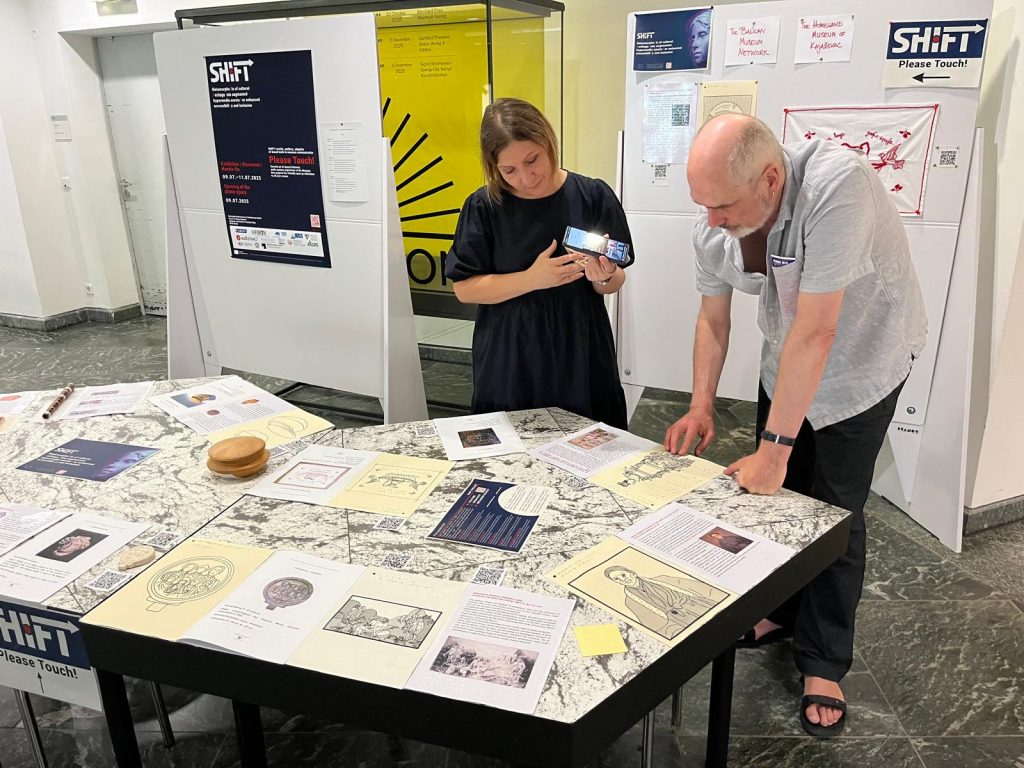SHIFT project pilots: an update
Over the past year, the SHIFT project has held a series of pilot events across Europe. Each pilot has tested innovative digital tools designed to make cultural heritage more inclusive and engaging for everyone. From Romania to Hungary, Germany to Serbia, the pilots have demonstrated how artificial intelligence (AI), virtual reality (VR), haptic technology and multimodal storytelling can open new doors for audiences, particularly those with disabilities.
Romania
The first pilot was launched in April during the ANBPR National Conference, BiblioNEXT 2025, in Sibiu. Titled Romanian History and Customs Explained to Digital Natives, it explored how libraries can use technology to make cultural heritage accessible to younger audiences. Rare books, photographs and archival recordings were enhanced with tools such as image-to-video animation, text-to-speech narration, real-time translation and automatic labelling.
The event placed a strong emphasis on inclusion, and a feedback session with participants from vulnerable groups helped identify strengths and areas for improvement, ensuring that the tools are refined to meet diverse needs.
Budapest
The second pilot followed in May at the Semmelweis Museum of the History of Medicine in Budapest. Over four days, visitors tested the VR-Haptic tool created by FORTH, which allows users to experience historic objects through touch in a virtual environment.
Participants, including people with hearing and visual impairments and those on the autism spectrum, were invited to explore a reconstruction of a 19th-century surgical procedure. Feedback was overwhelmingly positive, with users stressing how much such tools could enrich museum visits. A public event on 30 May gave wider audiences the chance to see behind the scenes, learn about the development process and ask questions directly to the technical teams.
Berlin
In July, the State Museums of Berlin hosted SHIFT’s third pilot, Please Touch! Towards an AI-based inclusive, multisensory experience of the Museum. Over three days, visitors engaged with iconic objects such as the Pergamon Altar using VR headsets and haptic gloves. These devices allowed people, particularly those with visual impairments, to sense textures, shapes and even the perceived temperature of sculptures.
Other innovations on display included soundscapes that bring digitised paintings to life, tools that convert images into spoken descriptions, and AI-supported storytelling techniques. Workshops explored how such technologies can be integrated into museum practice, encouraging curators to think beyond the visual and design experiences that speak to all the senses.
Serbia
The fourth pilot took place at the end of July at the Homeland Museum of Knjaževac in Serbia. Around 30 participants, from cultural professionals to representatives of disability groups, gathered to test SHIFT’s authoring tools, gesture recognition technologies and the main project platform.
The museum also presented its own tactile exhibition, featuring 3D replicas of artefacts, audio and video guides and sign language interpretation. A highlight of the event was the dialogue between Serbian and German associations of blind and partially sighted people, reinforcing the importance of international cooperation in developing accessible solutions.
Back to Romania!
The series continues this autumn with a second Romanian pilot on 17 September at the “I.H. Rădulescu” County Library in Târgoviște. Once again under the theme Romanian History and Customs Explained to Digital Natives, the event will present new features, including automatic text summaries, multimodal storytelling, affective text-to-speech voices adapted for different audiences, and innovative tools that transform still images into short videos.
Around 40 participants are expected, including librarians, academics, students, entrepreneurs and local officials, all exploring how libraries can embrace digital technologies to widen access to culture.
SHIFT (MetamorphoSis of cultural Heritage Into augmented hypermedia assets For enhanced accessibiliTy and inclusion) supports the adoption of digital transformation strategies and the uptake of tools within the creative and cultural industries (CCI), where progress has been lagging. Read more here. It is funded by the European Union’s Horizon Europe program.

